
Features
Crops
Vegetables
New phase for pepper harvesting robot program
February 6, 2015 By Wageningen UR

Feb. 6, 2015, Wageningen, the Netherlands — Work will start soon on Sweeper, an innovation-driven international research program for the development of the first generation, market-ready sweet pepper harvesting robot.
The research is being supported by the Horizon 2020 program of the European Union.
Wageningen University & Research Centre will coordinate the international network in which partners from Sweden, Israel, Belgium and the Netherlands will take part. The partnership includes universities, research institutes, a system integrator and a large grower of sweet peppers.
During the past decade, fundamental research has led to insights and technology developments that will allow the Sweeper partners to further develop the sweet pepper harvesting robot launched by CROPS, the previous European project.
The unit will be the first harvesting robot in the world operating in a commercial greenhouse. The robot will strengthen Europe’s leading role in agricultural robotics. It will also improve the competitiveness of the European greenhouse sector, which faces a low availability of skilled workforce.
PEPPERS FIRST, THEN OTHER VEGETABLE CROPS
The first generation market ready sweet pepper harvesting robot will open a new high-tech commercial area. Sweeper aims at sweet pepper only, of which 1.3-billion
kilograms are annually harvested in Europe.
It is expected that the knowledge and technology from the Sweeper program can easily be transferred to other greenhouse crops.
The Sweeper innovation program is a partnership between Umea Universitet in Sweden, Ben Gurion University of Negev in Israel, Proefstation voor de Groenteteelt in Belgium, Wageningen University & Research in the Netherlands centre, Irmato Industrial Solutions Veghel BV, and sweet pepper grower De Tuindershoek BV.
The European Union’s Horizon 2020 framework program for Research and Innovation is providing funding assistance of € 4 million.
Print this page